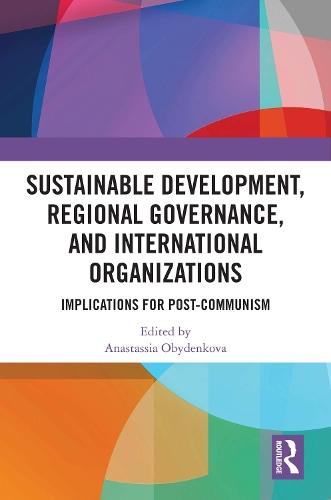Full Product Details
Author: Anastassia Obydenkova (Uppsala University, Sweden)
Publisher: Taylor & Francis Ltd
Imprint: Routledge
Weight: 0.453kg
ISBN: 9781032743813
ISBN 10: 1032743816
Pages: 158
Publication Date: 26 December 2025
Audience:
College/higher education
,
Tertiary & Higher Education
Format: Paperback
Publisher's Status: Forthcoming
Availability: Not yet available

This item is yet to be released. You can pre-order this item and we will dispatch it to you upon its release.
Reviews
“This volume is essential reading on how authoritarianism shapes environmental politics through regional governance organizations. The chapters are especially valuable for insights on climate governance in post-communist states – some EU members, and some not – and the influence of major non-democracies like Russia and China. Together these authors set out an important path for future research, showing how variation in domestic regime type may enable or constrain multilateral efforts to address environmental challenges.” Laura A. Henry, Bowdoin College, USA “This book provides innovative and much-needed analysis of the roles of authoritarian regional organizations (RO) and democratic regional environmental governance in the post-Communist region. Until now, we have known far too little about the roles of non-democratic ROs in many policy areas, including environmental issues. The authors collectively provide insight into the reasons why autocratic regimes and non-democratic ROs engage with environmental policy areas, finding that reputational concerns and mimicry outweigh sometimes effective policy action. On the hopeful side, the contributors find that civil society groups in the region benefit from resources and information provided by EU environmental bodies, and some post-Communist states learn from the information and strategies gained through participation in global climate forums.” Lisa McIntosh Sundstrom, The University of British Columbia, Canada “This book provides a comprehensive examination of the impact of regional international organizations on sustainable development and environmental agendas. Theoretically grounded, it explores both democratic and autocratic environmental regionalism, linking previously separate areas of study to shed new light on the complexities of global environmental politics in a post-communist world.” Jeronim Perović, The University of Zurich, Switzerland “This book highlights, among other issues, the important role played by non-Western states in countering climate change and environmental degradation. The chapters show the path toward environmental governance through regional NGOs and global efforts to improve environmental outcomes through policy actions aimed at sustainable development. The authors provide a model of engagement with academic literature in the service of positive policy outcomes.” Dmitry Gorenburg, Harvard University, USA
Author Information
Anastassia Obydenkova is a Research Scientist at the Institute for Economic Analysis at Spanish National Research Council (IAE‑CSIC), Spain, and an affiliated Professor at the Barcelona School of Economics (BSE), Spain. Her expertise is in comparative regionalism, sustainable development, geopolitics, international organizations, environmental politics, the EU Eastern Neighborhood, Eurasia, and China. She published multiple books and articles on these and other topics. She was awarded research fellowships at Yale, Harvard, and Princeton Universities. The author gratefully acknowledges financial support from grant PID2021-126209OB-I00 funded by MCIN/AEI/10.13039/501100011033 and by ERDF A way of making Europe.



